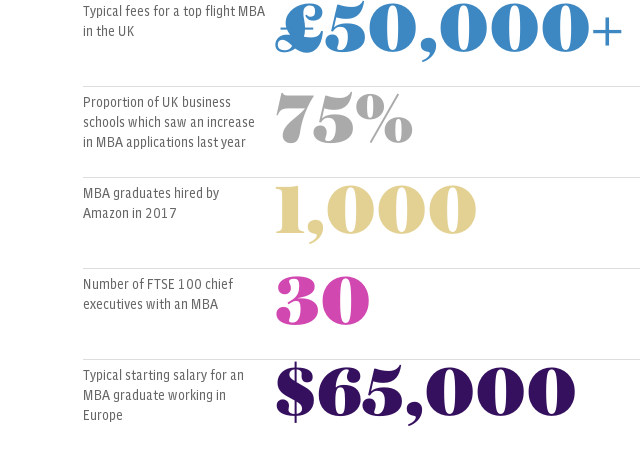Evolution of the MBA shows it still means business

Working as a consultant in the pharmaceuticals industry, Joseph Fitzgibbon wasn’t exactly in a dead end job. But he wasn’t happy with the direction his career was heading either.
“You know when you’re looking at your bosses and your clients and you don’t want either of their jobs, you’ve got a bit of a problem,” he says.
So in 2012 he joined the thousands of other young, ambitious Britons who each year stump up eye-watering fees for an MBA – in his case London Business School’s two-year course, which as of this year would set you back £78,500. “It is a risk because you’re fundamentally quitting your job and hoping it works out in the end,” he admits. In his case, the gamble paid off.
After graduating in 2014 he bagged a strategy job at drinks giant Diageo (and a 50pc pay rise) and has since gone on to hold senior roles at fast growing start-ups Graze and Clickmechanic.
Stories like Fitzgibbon’s explain why MBAs remain popular, with 75pc of UK courses experiencing a rise in applications last year, according to the Graduate Management Admission Council.

But with business models and the world of work changing at such a rapid pace, business schools face a battle to convince students it’s worth dedicating a year or two of their career and tens of thousands of pounds to a course whose content may soon be out of date.
Even as things stand, MBAs are not without their detractors. “Never ever hire an MBA. They will ruin your company,” the PayPal founder and Silicon Valley venture capital veteran Peter Thiel once reportedly warned.
But for the time being, they remain popular among many employers, including at the most senior levels – 30pc of FTSE 100 bosses had one last year according to research by headhunters Heidrick & Struggles.
“[Hiring MBAs] is about bringing in different ideas, innovative and creative thinkers,” says Colette Dennehy, a recruiter at drugs giant GSK. “They’ve invested in themselves through doing the MBA and we’re trying to tap into those capabilities.”

A big chunk of top MBA graduates end up working at financial institutions and consulting firms, but recently the growth in hiring has mostly been coming from the technology sector.
Ecommerce giant Amazon snapped up a thousand of them in 2017, with Google and Apple not far behind.
“What’s really valued in tech is the ability to be a generalist that can take on any problems … because in tech no two problems are the same,” says Serhat Pakyuz, who also studied at LBS and was one of Amazon’s hires last year. Not all MBAs are created equal, however, with the top schools such as Harvard, Wharton, Oxford and LBS being able to command fees several times higher than those further down the league tables on account of their big-name lecturers and deep-pocketed employers, and particularly the value of the contacts they allow students to create – both in person and through their alumni networks.
The stuff you learn in an MBA isn’t rocket science. But where you get that benefit is with the network
“The stuff you learn in an MBA isn’t rocket science, it’s accounting, HR, operations,” says Fitzgibbon. “A business school on position 100 in the league table can give you a good education in terms of learning that stuff. But where you get that benefit [at a top school] is with the network.”
When MBAs took off in the early 20th century, it was a pretty safe bet the course content would remain fairly consistent, at least for a decade or two if not for the lifetime of the student.
But from new business models such as the sharing economy to techniques such as big data analysis, the pace of change in the world of work is speeding up. That is forcing business schools to change curricula more frequently and to offer more specialised electives – LBS has modules on machine learning, managing digital organising and data-based decision making due to launch this year, for instance.
But it also brings into question the fundamental basis of an MBA – splashing out big bucks on a qualification at the start of your career that is supposed to set you up for life.
We have to help people adapt, adjust and develop – not just learn from standard static case studies
John Board, dean of Henley Business School, says there is now a greater focus in MBAs on broad topics such as strategy and leadership, as well as personal development, skills that will last down the decades, than on learning the transient “mechanics of business”.
Kellie Vincent, of University of Bedfordshire’s business school, adds: “We operate in this crazy VUCA (volatile, uncertain, complex and ambiguous) world and have to help people adapt, adjust and develop – not just learn from standard static case studies but really learn how to continue to learn.”
But Board admits in the long-term business schools may need to rethink the format of MBAs.
“What you’ll get is people who are much more engaged at a slower pace, but more deeply over their careers.”

 Yahoo Finance
Yahoo Finance 